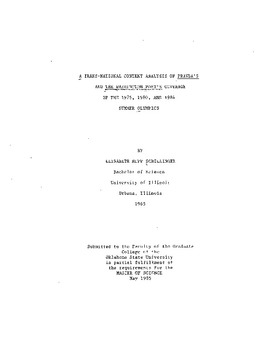| dc.contributor.advisor | Ward, W. J. | |
| dc.contributor.author | Schillinger, Elisabeth Hupp | |
| dc.date.accessioned | 2015-09-08T18:13:09Z | |
| dc.date.available | 2015-09-08T18:13:09Z | |
| dc.date.issued | 1985-05-01 | |
| dc.identifier.uri | https://hdl.handle.net/11244/17431 | |
| dc.description.abstract | Inspiration for this study came from an article entitled "The Olympics America Missed," by Kenneth Owler Smith. Professor Smith is on the journalism faculty at the University of Southern California and also serves as ad~inistrator of the university's Sports Information Program. The qrticle, which appeared in the November 1982 issue of The Quill, expressed Professor Smith's outrage at the lack of coverage given the 1980 Olympics in Moscow by the American media. Professor Smith was one of a "small, determined band of Americans" who defied President Carter's boycott and attended the Moscow Games. Before his departure, h'e made arrangements with the USC library to hold major newspapers and national magazines published during the Games. He also asked the broadcast division of the journalism school to videotape all network television coverage. Smith described his homecoming: I had scheduled a full two weeks for the review, but easily completed the job in less than three days,-my first indication that something was wrong, very wrong, indeed. The sheer paucity of material became a lesser consideration as hour after hour of review made it overwhelmingly clear that the American public had been served an almost exclusive diet of disgracefully xenophobic news. He then commenced to quote a score or so of the more blatantly anti-Soviet passages and headlines he came across in his review of the American media's coverage of the Moscow Games. Smith wondered if he and the journalists who provided the distorted fare all had been at the same place. A veteran of four Olympiads at that time, he considered the Moscow spectacle a "superb international celebration." When the author came across Smith's article�, the Los Angeles Games had come and gone, minus the Soviet Union and most of the other socialisr nations. It appeared that the Soviet boycott had created in 1984 a mirror image of the 1980 Olympiad, making it possible to contrast and compare the press performance of the Soviet Union and the United States under very similar conditions. This study's findings will do very little to placate or assure Professor Smith. Indeed his original outrage was well-founded and the 1984 Games have only compounded and further justified his initial concern. With the help of the American and Soviet press, the Olympics have been turned into cold war contests that serve to intensify the animosity between the two superpowers and nourish the feelings of distrust and animosity that exist between the people of the Soviet Union and the United States. | |
| dc.format | application/pdf | |
| dc.language | en_US | |
| dc.publisher | Oklahoma State University | |
| dc.rights | Copyright is held by the author who has granted the Oklahoma State University Library the non-exclusive right to share this material in its institutional repository. Contact Digital Library Services at lib-dls@okstate.edu or 405-744-9161 for the permission policy on the use, reproduction or distribution of this material. | |
| dc.title | Trans-national Content Analysis of Pravda's and the Washington Post's Coverage of the 1976, 1980, and 1984 Summer Olympics | |
| dc.type | text | |
| osu.filename | Thesis-1985-S334t.pdf | |
| osu.accesstype | Open Access | |
| dc.description.department | Mass Communications | |
| dc.type.genre | Thesis | |
